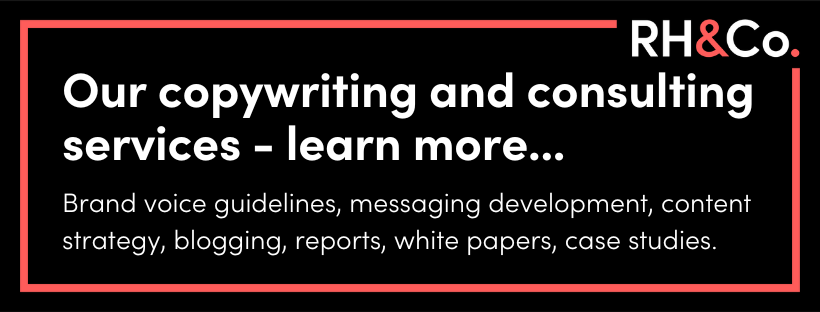

What should I look for in a copywriter?
“What should I look for in a copywriter?” I was so pleased to be asked this question recently. It’s one I wish more people asked. After all, if you’re going to entrust the words that represent your brand to someone, you want to make sure they’re going to do a good job. But so few people do any real research before making their choice.
What is a copywriter?
First things first, let’s define what a copywriter actually is and does. And no, it’s nothing to do with helping businesses secure copyright for their products or ideas.
The Merriam-Webster dictionary defines a copywriter as “someone whose job is to write the words for advertisements”. But that definition is pretty old fashioned and limited.
In fact, a good copywriter should be able to produce everything from website copy to blog posts, ad text, brochures, white papers, social media content, flyers, video scripts and more. Basically, if you need words for your business, go to a copywriter.
More than good grammar
So how do you tell whether someone is a good copywriter or not? Because it’s not as simple as being able to “write nicely”, or making sure the spelling, grammar and punctuation is right.
Those things are important, of course, but let’s face it – there are quite a few people who passed their GCSE English exams. Unlike brain surgery or advanced robotics, we all learn to write to some degree at school, which means plenty of people are more than capable of stringing a passable sentence together.
So, here’s what a copywriter needs to do for you…

A good copywriter will draw out your message
The copywriting process begins during the briefing, when your copywriter should be able to go beyond what you’re telling them and ask the kind of questions that really get to the heart of what you’re trying to communicate.
A good copywriter will sell the benefits
Whether writing a simple flyer or a complex website, it’s about understanding your target audience and what benefits will help them make the decision to buy from you. Yes, you might sell the most sophisticated widgets in town, but if your customers care about the fact that those widgets will protect their kids or save them money on their water bill then that’s what you need to talk about first, not the flashy tech.
A good copywriter will guide people around your website
Focusing just on website content now, one really important issue is navigability. Having gained a visitor to your site, the last thing you want is for them to click away before they’ve found what they’re looking for. Having understood your target clients, a good copywriter will use each element of the text – especially on the home page and any other landing pages – to clearly and quickly funnel them to the most relevant part of the site for their needs.
A good copywriter will understand page furniture
Strictly speaking a magazine term, but one that can apply more generally across any published material, on or offline. From subheads and bullet points that break up copy and improve scannability, to eye-catching pull quotes and buttons that drive action, there’s a lot more to great copy than well written body text.
A good copywriter will use the right amount of words
Which is usually less than you’d think. A good copywriter isn’t enamoured with the eloquence of their own writing. They understand that the reader is busy and probably just needs to get to the point. Of course, there are exceptions – but a good copywriter will know that too!
If you’re planning on getting a professional in to help you with your marketing copy, do make sure you do a bit of digging to see whether they’ll be able to genuinely help you. Check out their qualifications, ask for referrals and most importantly, have a look at work they’ve already done.
Because if you pick someone who simply “writes nicely” and spells properly, you’re going to miss out. And I don’t want that for you, because your business is worth more than that and if you’re going to pay a professional, you need to know that they’re really good at what they do.











